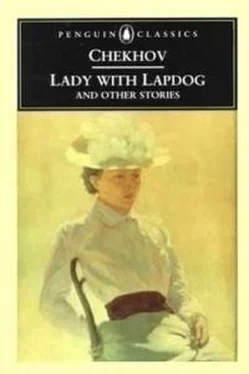"I have not seen you for a whole week; I have not heard you for so long. I long passionately, I thirst for your voice. Speak."
She fascinated him by her freshness, the naïve expression of her eyes and cheeks. Even in the way her dress hung on her, he saw something extraordinarily charming, touching in its simplicity and naïve grace; and at the same time, in spite of this naïveté, she seemed to him intelligent and developed beyond her years. He could talk with her about literature, about art, about anything he liked; could complain to her of life, of people, though it sometimes happened in the middle of serious conversation she would laugh inappropriately or run away into the house. Like almost all girls of her neighbourhood, she had read a great deal (as a rule, people read very little in S―, and at the lending library they said if it were not for the girls and the young Jews, they might as well shut up the library). This afforded Startsev infinite delight; he used to ask her eagerly every time what she had been reading the last few days, and listened enthralled while she told him.
"What have you been reading this week since I saw you last?" he asked now. "Do please tell me."
"I have been reading Pisemsky."
"What exactly?"
"'A Thousand Souls,'" answered Kitten. "And what a funny name Pisemsky had—Alexey Feofilaktitch!
"Where are you going?" cried Startsev in horror, as she suddenly got up and walked towards the house. "I must talk to you; I want to explain myself…. Stay with me just five minutes, I supplicate you!"
She stopped as though she wanted to say something, then awkwardly thrust a note into his hand, ran home and sat down to the piano again.
"Be in the cemetery," Startsev read, "at eleven o'clock to–night, near the tomb of Demetti."
"Well, that's not at all clever," he thought, coming to himself. "Why the cemetery? What for?"
It was clear: Kitten was playing a prank. Who would seriously dream of making an appointment at night in the cemetery far out of the town, when it might have been arranged in the street or in the town gardens? And was it in keeping with him—a district doctor, an intelligent, staid man—to be sighing, receiving notes, to hang about cemeteries, to do silly things that even schoolboys think ridiculous nowadays? What would this romance lead to? What would his colleagues say when they heard of it? Such were Startsev's reflections as he wandered round the tables at the club, and at half–past ten he suddenly set off for the cemetery.
By now he had his own pair of horses, and a coachman called Panteleimon, in a velvet waistcoat. The moon was shining. It was still warm, warm as it is in autumn. Dogs were howling in the suburb near the slaughter–house. Startsev left his horses in one of the side–streets at the end of the town, and walked on foot to the cemetery.
"We all have our oddities," he thought. "Kitten is odd, too; and—who knows?—perhaps she is not joking, perhaps she will come"; and he abandoned himself to this faint, vain hope, and it intoxicated him.
He walked for half a mile through the fields; the cemetery showed as a dark streak in the distance, like a forest or a big garden. The wall of white stone came into sight, the gate…. In the moonlight he could read on the gate: "The hour cometh." Startsev went in at the little gate, and before anything else he saw the white crosses and monuments on both sides of the broad avenue, and the black shadows of them and the poplars; and for a long way round it was all white and black, and the slumbering trees bowed their branches over the white stones. It seemed as though it were lighter here than in the fields; the maple–leaves stood out sharply like paws on the yellow sand of the avenue and on the stones, and the inscriptions on the tombs could be clearly read. For the first moments Startsev was struck now by what he saw for the first time in his life, and what he would probably never see again; a world not like anything else, a world in which the moonlight was as soft and beautiful, as though slumbering here in its cradle, where there was no life, none whatever; but in every dark poplar, in every tomb, there was felt the presence of a mystery that promised a life peaceful, beautiful, eternal. The stones and faded flowers, together with the autumn scent of the leaves, all told of forgiveness, melancholy, and peace.
All was silence around; the stars looked down from the sky in the profound stillness, and Startsev's footsteps sounded loud and out of place, and only when the church clock began striking and he imagined himself dead, buried there for ever, he felt as though some one were looking at him, and for a moment he thought that it was not peace and tranquillity, but stifled despair, the dumb dreariness of non–existence….
Demetti's tomb was in the form of a shrine with an angel at the top. The Italian opera had once visited S― and one of the singers had died; she had been buried here, and this monument put up to her. No one in the town remembered her, but the lamp at the entrance reflected the moonlight, and looked as though it were burning.
There was no one, and, indeed, who would come here at midnight? But Startsev waited, and as though the moonlight warmed his passion, he waited passionately, and, in imagination, pictured kisses and embraces. He sat near the monument for half an hour, then paced up and down the side avenues, with his hat in his hand, waiting and thinking of the many women and girls buried in these tombs who had been beautiful and fascinating, who had loved, at night burned with passion, yielding themselves to caresses. How wickedly Mother Nature jested at man's expense, after all! How humiliating it was to recognise it!
Startsev thought this, and at the same time he wanted to cry out that he wanted love, that he was eager for it at all costs. To his eyes they were not slabs of marble, but fair white bodies in the moonlight; he saw shapes hiding bashfully in the shadows of the trees, felt their warmth, and the languor was oppressive….
And as though a curtain were lowered, the moon went behind a cloud, and suddenly all was darkness. Startsev could scarcely find the gate—by now it was as dark as it is on an autumn night. Then he wandered about for an hour and a half, looking for the side–street in which he had left his horses.
"I am tired; I can scarcely stand on my legs," he said to Panteleimon.
And settling himself with relief in his carriage, he thought: "Och! I ought not to get fat!"
The following evening he went to the Turkins' to make an offer. But it turned out to be an inconvenient moment, as Ekaterina Ivanovna was in her own room having her hair done by a hair–dresser. She was getting ready to go to a dance at the club.
He had to sit a long time again in the dining–room drinking tea. Ivan Petrovitch, seeing that his visitor was bored and preoccupied, drew some notes out of his waistcoat pocket, read a funny letter from a German steward, saying that all the ironmongery was ruined and the plasticity was peeling off the walls.
"I expect they will give a decent dowry," thought Startsev, listening absent–mindedly.
After a sleepless night, he found himself in a state of stupefaction, as though he had been given something sweet and soporific to drink; there was fog in his soul, but joy and warmth, and at the same time a sort of cold, heavy fragment of his brain was reflecting:
"Stop before it is too late! Is she the match for you? She is spoilt, whimsical, sleeps till two o'clock in the afternoon, while you are a deacon's son, a district doctor…."
"What of it?" he thought. "I don't care."
"Besides, if you marry her," the fragment went on, "then her relations will make you give up the district work and live in the town."
Читать дальше












